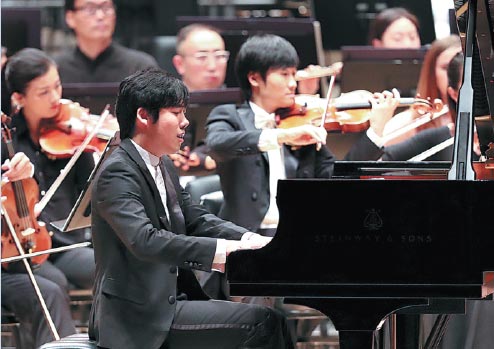 |
|
Pianist Zhang Haochen performs the Chinese classic piano concerto Yellow River with the Orchestra. [Photo/Xinhua] |
EYE-OPENING EXPERIENCE
More than 45 years after his first trip to China, Booth, 69, still clearly remembered his feeling at the time.
"It was almost like we were going to a different planet," said the violinist and second keyboard player.
Calling the 1973 trip to China "two weeks of discovery," Booth remembered almost every "surprise" and "interesting moment," such as being introduced to traditional Chinese instruments and tasting Chinese cuisine.
Moreover, "there were already quite a few people at that time that spoke English in China," while "there was nobody in our orchestra who spoke Chinese."
The gifted musician made his professional debut at the age of 13, but he couldn't help marveling at the artistic accomplishments displayed by the Chinese musicians in his interactions with them during that trip.
"China, even at that point, had a very strong connection with Western classical music, and the caliber the musicians had was already really phenomenally high," said Booth, calling the Yellow River Piano Concerto performed by the Chinese artists back then as "fabulous."
"Chinese musicians are on an incredibly high level. Each generation builds on the last generation," he said about his experience collaborating with different generations of Chinese artists over the past 46 years of his tenure in the orchestra.
Renard Edwards, a viola player, remembered the first China trip as helping in "broadening the horizon."
Edwards said he "was amazed that so many people were riding bicycles" on Beijing's streets.
It was mind-blowing to experience the famed Chinese scenic spots described in books, such as the Great Wall, the Forbidden City and the Ming Tombs.
"I am very much interested in the fine arts, painting, sculpture drawings, and to see what had been created for the royal court," said Edwards, while recounting his visit to the Forbidden City on the sidelines of the 1973 performance in China.
LASTING FRIENDSHIP
Twenty years after its first visit, the full orchestra returned to China in 1993, and has been expanding its collaboration with its Chinese counterparts.
The orchestra enjoys a long-standing partnership with the National Center for the Performing Arts in Beijing and the Shanghai Oriental Art Center. In addition, it has worked with the Shanghai Philharmonic Orchestra since 2016 in advancing cultural exchanges between the United States and China.
"Our relationship with China has been one of our strongest and one of the most continuous and one of the longest," said Booth, who has participated in about a dozen performances in China.
"It's a living relationship to enjoy," he added, while stressing the importance of people of different cultures communicating and interacting with each other through the universal language of music.
The Philadelphia Orchestra announced in late January that this year it will visit China on May 16-28 -- the orchestra's 12th tour to China -- to mark the four-decade milestone in U.S.-China diplomatic relations.
"The relationship between the Philadelphia Orchestra and the audiences in China predates diplomatic relations ... So, we have a responsibility to continue to build on those connections and to make them stronger," said Matias Tarnopolsky, president and CEO of the Philadelphia Orchestra. He added that his orchestra is "always looking for the next chance for greater collaboration" with China.
The orchestra's 2019 tour will begin and end with 40th anniversary concerts and residency activities in Beijing and Shanghai.
It will also include performances in China's northern city of Tianjin, Philadelphia's sister city, before performing in Hangzhou and making its debut in Nanjing.
"The orchestra's 40-plus years of trusted partnership with China is helping to keep the two peoples together," said Platt.
The former U.S. ambassador used an unusual comparison to describe the U.S.-China relationship, saying it "sort of resembles an iceberg" consisting of "a huge part that's below the water, which keeps the whole thing stable."